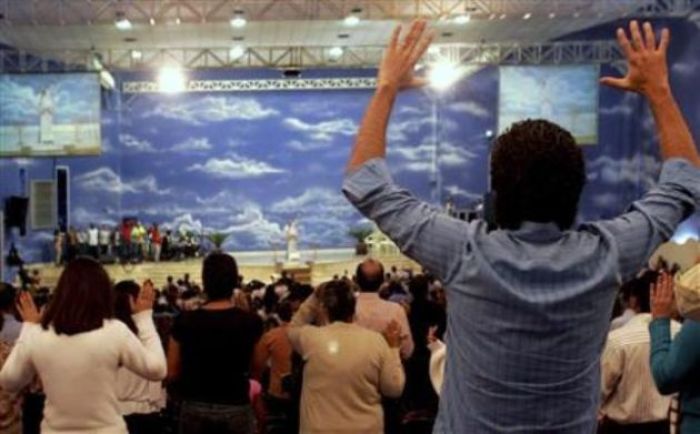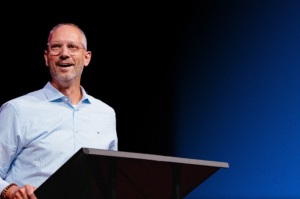Prosperity Gospel Is Latching Onto Evangelical Rise in Brazil Amid Economic Hardship

Prosperity gospel preaching, where charismatic leaders are offering people solutions to their economic troubles, is latching onto the growing evangelical movement in Brazil, a nation which observers say is undergoing significant spiritual shifts.
Pastor Bob Robbins of the evangelical English-speaking Sampa Church in Sao Paulo responded to a recent article in The Washington Post documenting such shifts by telling The Christian Post that Brazilians face many different spiritual influences.
"I think the biggest thing influencing the prosperity gospel in Brazil is the lack of hope and the struggling economy," Robbins, who alongside his wife, Martha, has been involved in church planting in the U.S. since 1999, told CP in an email Thursday.
"If a charismatic person can say that they have a solution for people's struggles they can get an audience. I am not sure that I can say the prosperity gospel is on the rise, but it is present and has a pretty large influence," he added.
The Washington Post article published Tuesday positioned that Brazil is going through a "modern-day version of the Protestant Reformation 500 years ago," and said that the world's largest Roman Catholic country is undergoing religious debates involving "church riches and corruption, political power, and the proper way to read the Bible."

It added that the belief that faith can bring economic riches, also known as the prosperity gospel, has spread among some Pentecostals, who account for about 70 percent of the country's Protestants.
Paul Freston, a sociologist and an expert in Pentecostalism in Latin America, explained that the prosperity gospel has moved through poorer neighborhoods, taking advantage of the record 13 percent unemployment rate that has plagued the country.
He said that promises for a better material life through giving and prayer, alongside strict social guidelines, such as banning ills like drinking and smoking, have given believers structure and agency over their lives.
Studying the appeal that Pentecostalism has on a growing number of Brazilians, some Catholic priests there have reportedly been mixing charismatic components into their services, such as catchier music.
Odilo Scherer, archbishop of Sao Paulo, explained that people follow their personal subjective tastes and experiences when it comes to church choices.
"In our Brazilian context, religion is presented as a product in a marketplace which seeks to please the customer and present a product that is appetizing," Scherer said.
Catholics are projected to become a minority in Brazil by 2030.
Robbins, who has lived in Brazil for one-and-a-half years now, said that the country's highly spiritual culture cultivates an environment for people to be influenced by those who seem to offer an easy way out of troubles.
"As a whole, most Brazilians are not very high on their country, and they are looking for something to hope in. The prosperity gospel is something that is easy for many people to hope in," he noted.
Some of Brazil's most prominent pastors have been accused of being involved in prosperity gospel preaching, such as Edir Macedo, founder of the Universal Church of the Kingdom of God, who has found great commercial success, launching several Bible-based prime-time soap opera hits.
Macedo spent 11 days in jail on charges of charlatanism back in 1992, and in 2011 he was charged with fraud and money laundering, accused of using billions of dollars in donations from his followers to buy jewelry, real estate and cars.
The Washington Post listed a number of the other major scandals involving prosperity gospel-accused preachers in Brazil, and included statements by some Presbyterian ministers, such as Augustus Nicodemus Lopes, who called such movements "cults" who take people's money while promoting supposed healing cloths anointed with oil.
Others, such as Silas Malafaia, a preacher who The Washington Post said wields "enormous political clout on behalf of the evangelical population," have said that there is nothing wrong with ministers acquiring wealth through side projects, such as books.
Malafaia insisted that pastors deserve to be compensated if their ministries are growing large.
"God wants me to be mediocre? The devil would give riches to everyone else?" he positioned.
Speaking about the role of money, Robbins told The Christian Post that it does play a big part in society, and in the church as well.
"In my opinion the role of the church is to help people learn how to be good managers of their money. As a pastor I don't want something 'from' people but I want something 'for' people," the Sampa Church pastor said.
"What I want is for people to live their life by Godly principles and that does include how they spend their money. It's not just giving to the church, but how they spend their money in all areas of their life."
The Gospel Coalition, a network of Reformed evangelical churches, has in the past warned about the prosperity gospel movement in Brazil.
Lopes, who was a plenary speaker at the Gospel Coalition's 2015 National Conference, said in an August 2016 article that many churches in the nation are affected by such teaching.
"On one hand, there's a growing interest on the part of both Pentecostals and neo-Pentecostals for the Reformed faith and expository preaching. Unfortunately, this growth has provoked counter-measures from various Assemblies of God and Arminian Baptist leaders," Lopes said at the time.
"They're concerned with the large number of young people becoming sympathetic to the doctrines of grace. On the other hand, a great majority of the so-called 'evangelical' churches in Brazil are plagued with prosperity theology and rampant syncretistic practices," he added.





























